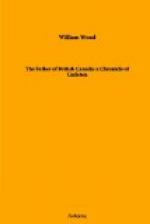Carleton was a man of great reserve and self-control. But his kindly nature must have responded to the cordial welcome which he received on his return to Quebec in October 1786. It was not without reason that the people of Canada rejoiced to have him back as their leader. All that the Indians imagined the Great White Father to be towards themselves he was in reality towards both red man and white. Stern, when the occasion forced him to be stern, just in all his dealings between man and man, dignified and courteous in all his ways, a soldier through every inch of his stalwart six feet, he was a ruler with whom no one ever dreamt of taking liberties. But neither did any deserving one in trouble ever hesitate to lay the most confidential case before him in the full assurance that his head and heart were at the service of all committed to his care. And no other governor, before his time or since, ever inspired his followers with such a firm belief that all would turn out for the best so long as he was in command.
This power of inspiring confidence was now badly needed. Everything in Canada was still provisional. Owing to the war the Quebec Act of 1774 had never been thoroughly enforced. Then, when the war was over, the Loyalists arrived and completely changed the circumstances which the act had been designed to meet. The next constitution, the Canada Act of 1791, was of a very different character. During the seventeen years between these two constitutions all that could be done was to make the best of a very confusing state of flux. Not that the Quebec Act was a dead letter—far from it—but simply that it could not go beyond restoring the privileges of the French-Canadian priests and seigneurs within the area then effectively occupied by the French-Canadian




